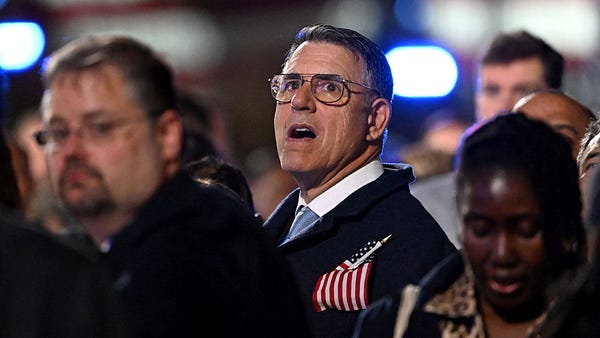
The Free Press

In April 1981, two days after his seventeenth birthday, Tim Walz joined the Army National Guard. His father and sister were both military veterans, and as he would later say in a 2009 Library of Congress interview, “I think it was instilled in us. I never really thought of a time when I wouldn’t join some branch.”
He stayed in the Guard, first in Nebraska where he grew up, and then in Minnesota, through high school and college and beyond—24 years in all. Walz was eligible to leave the Guard with a full pension in 2001, but he reenlisted after the September 11 terrorist attack, because, as he later said, he felt a “real sense of wanting to do something” in the wake of the 9/11 attacks.
Guard units are required to train one weekend a month, plus several weeks in the summer, but they also handle emergencies. Walz recalled helping with “tornado clean-ups, flood fights in Grand Forks. . . forest fires in Yellowstone, those types of things.” From the summer of 2003 until April 2004, in the early stages of the war in Afghanistan, Walz went with his unit to Italy, where his battalion provided security at U.S. military bases in that country.
Over the years, Walz won a series of promotions, the last of which was command sergeant major, the highest rank an enlisted man can attain in the National Guard. But because he failed to complete the onerous coursework required to keep the rank, he had to give the promotion back when he retired to run for Congress in 2005. His final rank was master sergeant, which is still nothing to sneeze at.
It all sounds pretty straightforward, right? Walz’s experience echoes that of hundreds of thousands of Americans who have done their part for their country by serving in the National Guard. But since Kamala Harris picked Walz to be the Democrats’ vice-presidential candidate—opening him up to national scrutiny—it has been anything but.
For the past two weeks, inconsistencies have emerged in the story Walz has told about his service—and in the story he has allowed others to tell over the years. Depending on your point of view, this is either sloppy or mendacious. Republicans are pushing the idea that it’s the latter, hoping to damage his credibility like the Swift Boat Veterans for Truth did when John Kerry ran for president in 2004. Critics argue that Walz lied about achieving the rank of command sergeant major, and that he ducked deployment to Iraq by retiring just a few months before his unit was supposed to be sent there.
Worst of all, they accuse him of “stolen valor”—that is, of having lied about seeing combat. “I’d be ashamed if I was him and I lied about my military service like he did,” J.D. Vance, who spent six months in Iraq as a Marine in a non-combat role, said at a press conference last week.
On Tuesday, Walz forcefully pushed back, stating “I am damn proud of my service to this country” in a speech before a union convention in Los Angeles. “And I firmly believe you should never denigrate another person’s service record.”
We took a closer look to find out which of the attacks are true—and which belong in File 13 (military slang for the garbage can). Here’s what we found:
Claim #1: Walz lied about serving in active combat.
Walz’s critics have dug up three examples of when he implied that he fought in either Iraq or Afghanistan. Let’s break down each one:
Operation Enduring Freedom
In 2005, when Walz first ran for Congress, he published a press release referring to himself as a “veteran of Operation Enduring Freedom”—the name the White House gave to the war in Afghanistan and the broader war on terrorism. Technically, Walz’s service in Italy was part of Operation Enduring Freedom, since he was deployed to support Air Force personnel who were stationed at U.S. air bases in Italy during the war. But he was far from the line of fire, which is what most people assume when they hear “veteran of Operation Enduring Freedom.”
That November, Tom Hagen, a Minnesota National Guardsman who served in Iraq, wrote a letter in local paper, the Winona Daily News, attacking Walz for “misleadingly giv[ing] the impression that he served in a combat zone.” It’s not that Walz was flat-out lying, Hagen argued, but rather that he conveyed this “impression” through “artful omission.”
Walz wrote back to the same newspaper two days later in his own letter condemning “the ridiculous claim that I am misleading voters” and calling it a “partisan political attack” that emerged days before he was set to take the debate stage against his GOP opponent.
In his Library of Congress interview from 2009, Walz said that after his unit found out they would be deployed to Italy in 2003, he and his fellow soldiers felt “disappointed” and “guilty” that they “weren’t in the fight up front.” But, he said, “it didn’t take long to figure out that we had a lot of resources to help out” with the general war effort while in Italy. As a Minnesota National Guard spokesman said, Walz’s “battalion supported security missions at various locations in Europe and Turkey.”
“Weapons of War”
The second time Walz implied he had seen combat came in 2018. During remarks promoting gun control laws during his gubernatorial campaign, Walz said, “We can make sure that those weapons of war that I carried in war is the only place where those weapons are at.”
The Harris campaign shared the video in an X post on August 6 after Walz became her running mate—and it was met with swift backlash from online commentators, who responded to the post with questions like “What war did Walz fight in?” and “The war you dodged. . . ?”
A campaign spokesman has since said that Walz “misspoke,” but then added, “He did handle weapons of war and believes strongly that only military members trained to carry those deadly weapons should have access to them, unlike Donald Trump and J.D. Vance who prioritize the gun lobby over our children.”
“I stood. . . on the tarmac at Bagram.”
Finally, in 2021, Walz gave a speech commemorating 9/11 at the Minnesota State Capitol. He talked about his memories of that fateful day, as a teacher in a high school classroom when the two planes hit the World Trade Center. He spoke of the profound sacrifice made by Minnesota’s Gold Star families. He talked of Minnesotans who gave their lives at Gettysburg. And then he told a story about his own service:
“I had the privilege of serving in this state’s National Guard,” he said. “And when I left, I had a two-year-old. When I came home, I had a three-year-old.”
He talked about the impact of this absence on his child, and how much worse it was for other children whose parents never came home. Then he amped up the drama: “Over the preceding years of watching us, and as our nation changed, and as our political systems became more difficult for all of us to understand, I stood one night in the dark of night on the tarmac at Bagram and watched a military ramp ceremony” —referencing a tradition that honors fallen U.S. soldiers.
Bagram is a former military base in Afghanistan. Critics say the impression he gave—clips of which have gone viral on X this week—was that Walz’s overseas Guard duty had put him squarely in the middle of a combat zone where he witnessed military rites recognizing a soldier’s highest sacrifice.
Walz’s remarks conflate two events: the first was his deployment in Italy at a time when he had a small child. The second appears to reference a trip Walz made to Bagram in 2008—when he was a congressman. Maybe he did stand there “in the dark of night on the tarmac” and watch the remains of deceased soldiers being loaded onto an airplane during a military ramp ceremony. Or maybe not. Either way, he was not visiting Bagram as a soldier. And he certainly left that impression.
Complicating the matter is the written draft of Walz’s speech. Excerpts were published in a book by the Minnesota Military and Veterans Museum. The book quotes Walz saying he attended the ramp ceremony in Iraq, not Afghanistan. But he didn’t say that in the actual speech.
Claim #2: Walz retired from service in order to avoid combat.
As we mentioned earlier, Walz retired from the National Guard in 2005 after he decided to run for Congress. Then, months later, his battalion was deployed to Iraq, where they stayed for more than a year.
At least three former Guard members who served with Walz have come forward to accuse him of shirking his duty to his troops by quitting the Guard to run for Congress. In other words, they claim he was a coward.
“Nobody wants to go to war. I didn’t want to go, but I went,” Doug Julin, a retired National Guard soldier who knew Walz, told The Washington Post. “The big frustration was that he let his troops down.”
This claim has stuck to Walz since the early days of his political career. In that same November 2006 letter in the Winona Daily News, retired Guardsman Tom Hagen wrote that Walz “abandon[ed] his fellow soldiers and quit when they needed experienced leadership.”
J.D. Vance has led the Republican charge against Walz on this issue.
“When Tim Walz was asked by his country to go to Iraq, do you know what he did? He dropped out of the Army and allowed his unit to go without him,” Vance said during a news conference in Michigan last week.
But while Walz knew at the time of his May 2005 retirement that a deployment to Iraq could be forthcoming, neither he nor anyone else in his unit knew when that might take place. Nor has any solid evidence emerged to indicate that he decided to retire to avoid going to Iraq.
In February 2005, Walz filed papers to run for Congress in Minnesota. He did not hide the fact that his unit was likely to eventually serve in Iraq. His campaign issued a press release saying the Guard had informed his battalion it could be deployed to Iraq within the next two years.
“As Command Sergeant Major I have a responsibility not only to ready my battalion for Iraq, but also to serve if called on. I am dedicated to serving my country to the best of my ability, whether that is in Washington D.C., or in Iraq,” he said in the release.
According to the Minnesota National Guard, Walz’s battalion didn’t receive official notification of the deployment until July 2005, two months after his retirement.
While several of Walz’s fellow Guardsmen have criticized his retirement, others have jumped to his defense. Retired Sergeant Major Joseph Eustice, who served alongside Walz in the Minnesota National Guard, told NewsNation that Walz “fulfilled his duty” through his over two decades of service and that he “had every right to leave” when he did.
Claim #3: Walz lied about attaining the rank of Command Sergeant Major.
The allegation that Walz lied—and continues to lie—about achieving the rank of Command Sergeant Major may be the least important of the major accusations against his military record, but it’s also the one that has the most substance. Because basically, he did.
Was Walz promoted to Command Sergeant Major? Yes. But the coursework to lock in the promotion—both in person and online—requires hundreds of hours, and Walz, busy with the rest of his life, did very little of it. As a result, when he departed the Guard, he did so at a few ranks lower, as master sergeant.
Even so, he has referenced his higher rank throughout his political career.
In a 2006 campaign appearance, he referred to himself as a “retired Command Sergeant Major.” His official bio as governor still says, “After 24 years in the Army National Guard, Command Sergeant Major Walz retired from the 1-125th Field Artillery Battalion in 2005.”
In his 2009 Library of Congress interview, Walz also says he “achieved the rank of Command Sergeant Major,” and that a congressional historian told him that he was “the highest ranking enlisted soldier ever to serve in Congress.”
Democratic colleagues have also played fast and loose with the facts about Walz’s record—and Walz has not corrected them. In 2007, House Speaker Nancy Pelosi introduced incoming freshman congressman Tim Walz at a press conference, describing him as a retired “command sergeant major” and thanked him for his “service on the battlefield.” When Walz stepped up to speak, he did not fix the mistake.
In recent days, the Harris campaign has directed media questions about Walz’s rank to a 2018 article on the Minnesota Public Radio website, which acknowledges that Walz “was reduced in rank months after retiring, leaving him as a master sergeant for benefits purposes.”
Captain Holly Rockow, a public affairs officer for the Minnesota National Guard, said that it is legitimate for the VP candidate to say he served as a command sergeant major. Nonetheless, last week, the Harris campaign quietly removed a reference to Walz as a “retired command sergeant major” from their campaign website. They replaced it with a subtle change, stating that Walz “served for 24 years, rising to the rank of Command Sergeant Major.”
Over the years, there have been plenty of politicians who have exaggerated their military service—or falsely claimed to serve when they never did. On the one hand, it seems as though we can now add Tim Walz to that list. On the other hand, his transgressions appear to be more sloppy than venal. Whether his comments qualify as “stolen valor” is in the eye of the beholder.
Francesca Block and Joe Nocera are reporters for The Free Press. To support more of our work, become a subscriber today:















There’s something else here. Walz served 20 years in the guard. Could have retired in 2001 but re-enlisted after 911.
He could have left it there and had some bragging rights to use in his new career as a politician. He never saw combat but he did serve.
Instead he intimates in various forums and repeatedly that he did see combat plus lied about his rank. How much forward thinking did it require to conclude that such play acting might not sit well with the gent who took his place in Iraq nor with the troops under his command.
Is it just me or is Walz a bit of a dim bulb?
Here’s a thought:
In an IQ Challenge Faceoff, who would you pick, Walz or Harris? Either way, the loser would still not be as dumb as Nocera seems to think his readers are. “…eye of the beholder.”. That’s a good one. To top it off he ends the piece on a cliche.
He got a ribbon for the operation and he said he was part of that operation. "Over the preceding years" means an implication he's still a soldier on a tarmac in Bagram? Not. As a veteran myself, it is highly likely the Public Affairs office escorted him, congressman him, to a transfer of remains ceremony on the airfield. Vance works for a man that truly believes a civilian medal is better than the Medal of Honor. Trump's comparison was based on his delusion that being seriously wounded or killed lessened the value of the Medal of Honor compared to the Civilian medal. Hints of "losers and suckers" radiate again! Vance's boss has no idea what honor is, based off of his verbal throw ups. It's a national disgrace the Republicans continue to allow his leadership and anoint him with the nomination. It will be their ruin.